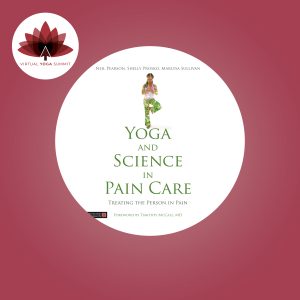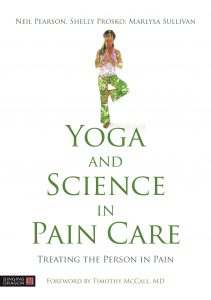
Marlysa Sullivan, Shelly Prosko, Neil Pearson and Amy Wheeler talk about yoga and science in pain care.
Shelly, Marlysa and Neil have a new book they co-edited and co-authored called: “Yoga and Science in Pain Care: Treating the Person in Pain” with Singing Dragon publishers.
In this webinar:
Shelly discusses the nuances and different orientations of compassion in pain care and how having compassion for self, and for the other, is critical for better pain care outcomes. She discusses some of the topics of her book chapter about what the current research is saying about compassion, why we don’t always act in compassionate ways, compassion in healthcare, and the value of integrating compassion training along with the wisdom traditions and practices of yoga into modern day pain care without getting practitioner burnout. She explains that yoga is inherently a compassionate practice and can also offer a space for further compassion to emerge. Shelly also shares with us the difference between the terms “Persistent Pain” and “Chronic Pain” and when/why to use them.
Neil is one of the global leaders in pain education, including education on pain biology. He summarizes what the research says about how pain is not an accurate indicator of tissue health. No one diagnostic test or alarm from our body tells the whole story about how we will experience pain, how our nervous system is wired to receive and give danger signals and what other factors contribute to the lived experience of chronic pain. He discusses if we should use pain as a guide for how far to push ourselves in exercise and movement practices. He goes on to explain how education about pain management is an intervention tool.
Marlysa discusses her passion for eudaimonia (finding meaning and purpose in life) when living with chronic pain. She explains when we have meaning, connection and purpose, that numerous (and very fascinating) physiological changes take place in our bodies. These changes have been thoroughly researched in scientific studies, and have been shown to contribute to positive health changes, particularly helpful for people living with persistent/chronic pain. A Yoga Therapist has the potential to help a person in pain find connection, meaning and purpose in life. This will impact the client’s physiology, their perception and ultimately their experience of pain.
The 3 also discuss the White Paper they have co-authored along with Matthew Taylor about how and why yoga therapy can be part of the national Integrative Pain Policy Congress’ strategy towards Comprehensive Integrative Pain Management (CIPM) to address the current public health pain crisis. The paper includes a review of the available evidence we have to support yoga therapy as an important team member of CIPM and outlines recommendations and CTAs to make impactful progress towards better pain care. The paper is currently under peer-review and hopefully published in 2020.
Chapter contributors to “Yoga and Science in Pain Care” include Joletta Belton, Steffany Moonaz, Matthew Taylor, Matt Erb, Lori Rubenstein Fazzio, Tracey Meyers Sondik, Michael Lee, Antonio Sausys Marun-Avisap, with foreword by Timothy McCall, MD.
 Yoga and Science in Pain Care
Yoga and Science in Pain Care
Treating the Person in Pain
Edited by Neil Pearson, Shelly Prosko and Marlysa Sullivan. Foreword by Timothy McCall.
This is an integrated approach to pain rehabilitation that combines pain science, rehabilitation and yoga with evidence-based approaches from respected contributors. The book shows how to integrate the practices of yoga and pain science, and promotes the movement to a patient-valued, partnership-based biopsychosocial-spiritual model of healthcare. Read more